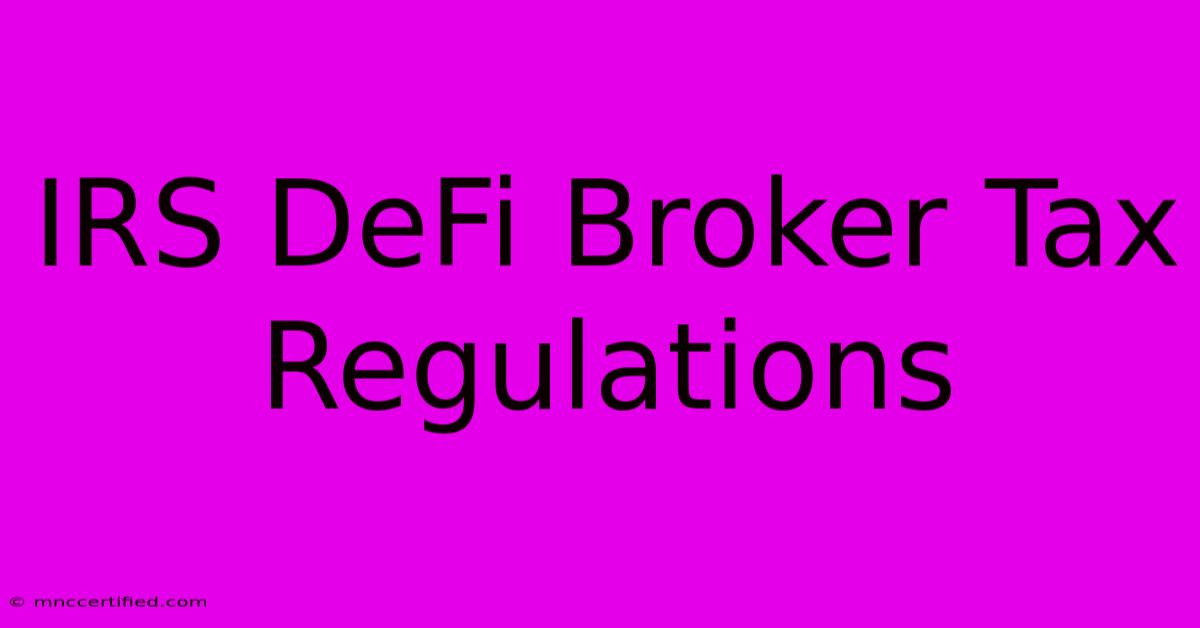IRS DeFi Broker Tax Regulations

Table of Contents
IRS DeFi Broker Tax Regulations: Navigating the Murky Waters of Decentralized Finance
The world of Decentralized Finance (DeFi) is rapidly expanding, offering innovative financial services without traditional intermediaries. However, this innovative landscape presents challenges for tax compliance, particularly in the United States, where the Internal Revenue Service (IRS) is actively clarifying its stance on DeFi transactions. This article provides a comprehensive overview of the current IRS DeFi broker tax regulations, highlighting key aspects to help you navigate this complex area.
What Constitutes a DeFi Broker Under IRS Guidelines?
The IRS's definition of a "broker" in the context of DeFi is still evolving. Currently, the focus is on entities facilitating transactions, providing crucial information, and potentially holding custody of assets. This broad definition potentially encompasses a wide range of actors within the DeFi ecosystem, including:
- Decentralized Exchanges (DEXs): While DEXs are designed to be decentralized, the IRS might consider certain DEXs as brokers if they provide significant user support, facilitate order matching, or maintain records of user transactions.
- Automated Market Makers (AMMs): AMMs, like Uniswap and Pancakeswap, automatically execute trades based on liquidity pools. The IRS's stance on whether AMMs meet the definition of a broker is still unclear and requires further clarification.
- Yield Farming Platforms: Platforms offering yield farming opportunities might be considered brokers if they facilitate the transaction of assets or provide essential information related to user earnings.
- Custodial Wallets: Services offering custodial wallet solutions, even if decentralized, could fall under the IRS definition of a broker if they provide substantial assistance in conducting transactions.
The key takeaway: The IRS is focusing on the functionality provided, rather than the decentralized nature of the platform. If a platform provides significant services that facilitate transactions and reporting, it might be considered a broker, triggering reporting requirements.
Reporting Requirements for DeFi Brokers and Users
If a DeFi platform is deemed a broker under IRS regulations, it's obligated to report certain information to the IRS and to users. This includes:
- Form 1099-B: This form reports proceeds from brokerage transactions, including gains or losses from DeFi activities like trading, staking, or yield farming.
- Transaction details: This might include dates, amounts, and the specific cryptocurrencies involved in each transaction.
For users: Receiving a 1099-B from a DeFi broker means you are responsible for accurately reporting these transactions on your tax return, specifically Schedule 8949. Failure to do so can lead to penalties and interest from the IRS. Even if you don't receive a 1099-B, you are still obligated to report all your DeFi income and gains. Accurate record-keeping is crucial.
The Challenges of DeFi Tax Compliance
Several factors complicate DeFi tax compliance:
- Lack of clear regulatory guidance: The rapidly evolving nature of DeFi presents challenges for regulators in establishing clear guidelines.
- Pseudonymity and privacy: The pseudonymous nature of many DeFi platforms makes it difficult to track transactions and identify users.
- Complex transactions: The complexity of DeFi protocols and yield farming strategies can make it challenging to accurately calculate taxable gains or losses.
- Cross-border transactions: Transactions involving multiple jurisdictions add further complexities to tax reporting.
Proactive approach is key: Given the evolving nature of IRS guidelines and the inherent complexity of DeFi transactions, it's crucial to seek professional tax advice from a qualified accountant or tax advisor specializing in cryptocurrency.
Strategies for Minimizing DeFi Tax Risks
- Maintain meticulous records: Keep detailed records of all your DeFi transactions, including timestamps, amounts, and relevant addresses.
- Utilize tax software: Specialized crypto tax software can help automate the calculation of capital gains and losses from DeFi activities.
- Consult with a tax professional: A qualified tax advisor can offer guidance on navigating the complexities of DeFi tax regulations.
- Stay updated on IRS announcements: The IRS continues to issue guidance on cryptocurrency taxation. Staying informed is vital for compliance.
Conclusion: Navigating the Future of DeFi and Tax Compliance
The intersection of DeFi and tax regulations is still largely uncharted territory. The IRS is actively working to clarify its stance, but the responsibility for compliance ultimately rests with individual users and platforms. By staying informed, maintaining meticulous records, and seeking professional advice, you can minimize your tax risks and navigate the complexities of this exciting yet challenging financial landscape. Remember, proactive planning and accurate reporting are crucial for ensuring compliance with evolving IRS DeFi broker tax regulations.

Thank you for visiting our website wich cover about IRS DeFi Broker Tax Regulations. We hope the information provided has been useful to you. Feel free to contact us if you have any questions or need further assistance. See you next time and dont miss to bookmark.
Featured Posts
-
Take The 2024 Big City Knowledge Quiz
Dec 28, 2024
-
Deceased Nk Soldier In Ukraine Report
Dec 28, 2024
-
Phoenix 2024 Cost Of Living Bills 2400
Dec 28, 2024
-
Report Og Maco Rapper Dies Aged 32
Dec 28, 2024
-
Syracuse Football Another Mc Cord Win
Dec 28, 2024